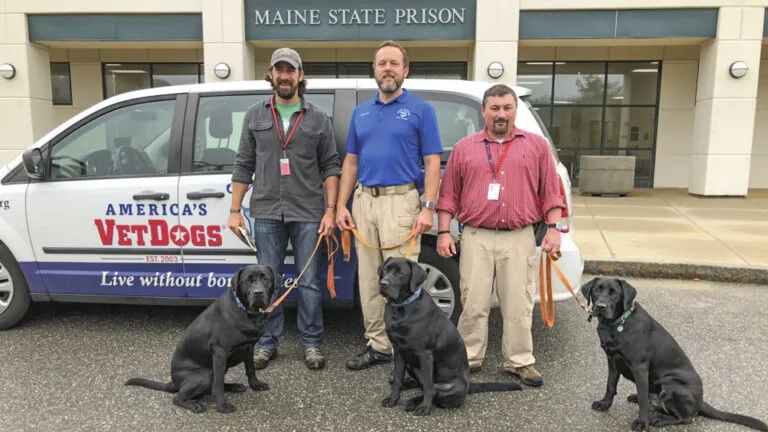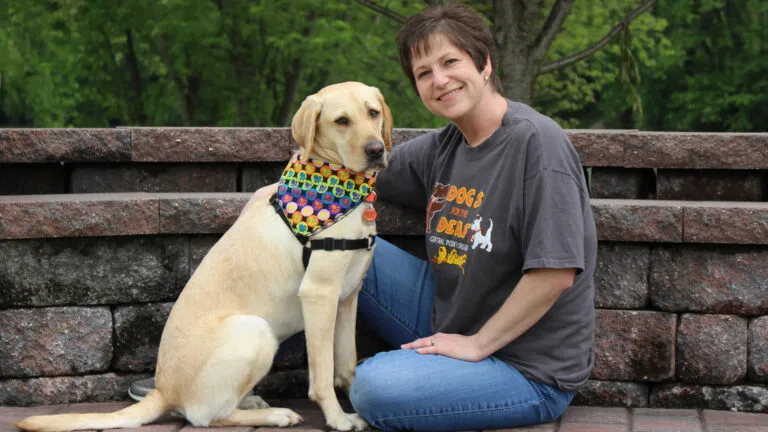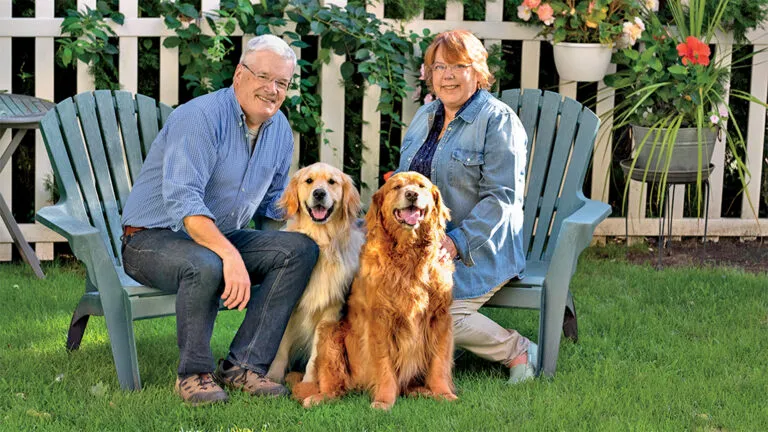Istanbul, May 4, 2011. I paced an alley in the middle of the city, fuming. I was a retired Marine Corps Reserve colonel. I’d come almost 6,000 miles, from Omaha, on a mission that now looked hopeless. This isn’t going to work, I thought. He’s not coming home. The he in question? A donkey.
A donkey whose life had intersected with mine three years earlier, in Iraq.
I’d been recalled to active duty to serve as commandant at Camp Al-Taqaddum for the 1st Marine Logistics Group. My Marines took care of infrastructure on the base—roads, electricity, water, trash collection. One afternoon, my commanding general showed me a YouTube video of several Marines trying to capture a donkey roaming around our base. Someone had pulled footage from our security cameras and set it to music—“Yakety Sax,” the frenetic theme song from The Benny Hill Show. The video was hilarious. “Next time there’s a donkey on base, you ought to catch it,” the general said, laughing.
He was joking, but I couldn’t help thinking how cool that would be. I loved animals. I had dogs growing up and I couldn’t pass an injured bird or rabbit without trying to nurse it back to health. My wife, Cate, and I taught our teenage son and daughter to care for God’s creatures like God cares for us.
“If you ever see a donkey around, catch it,” I told one of my sergeants.
Sunday morning several weeks later, a sound like an out-of-tune bugle jarred me awake. Heehaw, heehaw, heehaw!
Did I just hear what I thought I heard? I hopped out of bed and stepped outside. Sure enough, there, tied to a eucalyptus tree, stood a donkey. My sergeant had done it. It was a young jack. Grayish-brown and scrawny, with big ears. Cute fella. He looked like a living Eeyore, minus the ribbon on the tail. His most distinctive feature was the long black stripe running down his back, crossed by another stripe along his shoulders.
It reminded me of a legend I’d heard as a boy: that donkeys are marked with a cross because their ancestors served our Lord. They carried the pregnant Mary to Bethlehem, took Mary and Baby Jesus to Egypt to escape Herod, and carried Jesus into Jerusalem on Palm Sunday. The cross was a testament to their loyal service.
I walked closer, sized up the donkey. He peered back at me. There was no fear in his big brown eyes. Only brightness and kindness. Heehaw, heehaw! It was like he was saying, “Here I am!”
“Nice to meet you too,” I said.
The first order of business was finding some donkey-friendly food. The camp was on a barren desert plateau—no grass, very few plants. I went to our cafeteria. Workers gave me apples and some stale hot-dog buns, and I found an old cooler for his water.
The donkey couldn’t live on apples and stale bread forever, though. A young Iraqi merchant who ran a shop on base made regular trips into town. He said he’d get alfalfa from a farmer.
The next morning, I got up to make my rounds of the camp as usual, but this time I brought the donkey with me. A Marine colonel walking a donkey on a rope—we must’ve been quite a sight! Before long, almost everyone on base knew about “the colonel’s donkey.” One evening, he snatched a lighted cigarette right out of a Marine’s hand and gobbled it up, burning tobacco and all. We christened him Smoke.
Soon Smoke was a star. People came by his corral to pet him, bring him snacks, take him for walks. Marines, soldiers and sailors wrote and called home about him. While he couldn’t talk like Balaam’s donkey in the Old Testament, he was smart enough to open an office door and go inside to mooch candy. Someone even set him up with a Facebook page.
During a briefing, a few of my Marines put up a slide that had a Photoshopped picture of me and a line of donkeys in flak jackets and helmets with the words “Ready for Battle. A new breed of warrior! Lives off the land. Eludes captors for hours. Superb hearing.” I laughed along with everyone else.
Smoke was a real morale booster. Since pets were forbidden in a war zone, a Navy physician wrote a memo on Smoke’s value as a therapy animal. I got him a camouflage shirt, size large, and had our tailor remove the collar and sleeves and stitch “Smoke” on the name tape. Smoke the Donkey, reporting for duty, sir. Smoke got fan mail—cards, drawings, treats. A lieutenant colonel’s wife made him a personalized blanket. Everyone loved Smoke. He was a loyal member of our team.
I worried about what would happen to him when our deployment ended. Fortunately our replacements from the 2nd Marine Logistics Group assured me that they would take over his care.
I returned home to Omaha in February 2009. Time to focus on my civilian work running the nonprofit group I had founded, Wounded Warriors Family Support. And I certainly had a lot of catching up to do with Cate and our kids.
In August 2010, a month before I was due to retire from the military, I was in my basement, plowing through 30 years’ worth of Marine Corps memorabilia. I thought about everyone I’d served with, from my active-duty days as a helicopter pilot to my time in Iraq. What about my battle buddy Smoke?
I called the major who’d taken over for me. He told me that when his group’s deployment ended they looked for someone to take Smoke and a local sheik agreed. A sheik? While some farmers in Iraq still use donkeys, the animals are largely left to fend for themselves. I’d even read about live donkeys being fed to lions in the Baghdad Zoo. I couldn’t let that happen to Smoke! I had to bring him home. To me, his status was as official as that of a bomb-sniffing dog. If military dogs were transported home, why not Smoke?
Sign up for Guideposts Free e-Newsletters and Get Inspiration Delivered to Your Inbox
The major had contact info for the sheik. I fired off an e-mail. It took weeks of effort—State Department personnel even got involved—before I heard from the sheik. He assured me Smoke was fine. But he wanted $30,000 for him. I explained that Smoke had served the Marines loyally and earned his retirement. Finally, the sheik agreed to turn him over at no charge. The catch? I had to find someone in Iraq willing to round him up. Then I had to figure out the best transportation route.
A new mission. I got to work. An American named Terri, who ran Operation Baghdad Pups, a program of SPCA International, had already agreed to coordinate Smoke’s travel. She went regularly to Irbil, in northern Iraq, to pick up dogs and cats and reunite them with the U.S. veterans who’d befriended them. SPCA International had no experience with livestock but got on board.
Smoke was trucked to Irbil in mid-January, 2011. Terri was going to take him to Istanbul, where he could catch a cargo flight to Europe. Simple enough. Only it wasn’t.
Terri spent weeks making arrangements. She and an Iraqi colleague left with Smoke on April 5. I planned to meet them in New York a couple of weeks later. But almost immediately things went awry. It took a full day to work through the border checkpoints into Turkey, even with the help of a U.S. Army major stationed there. Then Terri was told emphatically that no Iraqi animals had entered Turkey since the war started, in 2003.
It took another two weeks to overcome that diplomatic roadblock, aided by the Marine Corps attaché and other U.S. Embassy staff in Ankara, including the deputy chief of mission; a petition drive by SPCA International; and worldwide press attention.
Smoke arrived in Istanbul on April 19, only to get tangled in more red tape. I flew to Turkey to help. Now here I was, pacing an alley in Istanbul, running out of patience. Of hope. What was I thinking, trying to get a donkey from Iraq to the United States? Yet like a donkey, I was too stubborn to quit.
I called a German woman who’d been trying to secure the transit permit for Smoke so he could pass through Germany. I poured my heart out—told her how he had become a therapy animal at Camp Al-Taqaddum, how he’d helped military families connect during the war, how I couldn’t abandon him, because Marines leave no one behind. She listened, offering no assurances.
“But Smoke has his own Facebook page!” I said, desperate.
There was a pause. “He does?”
She looked up the page and contacted the veterinarian at Frankfurt Airport, who was equally impressed by Smoke’s celebrity. The vet gave permission for the donkey to travel through Germany (and Smoke made two new Facebook friends).
Smoke landed in New York City on May 12 and was taken to the Animal Import Center in Newburgh, New York, 60 miles north. That’s where I drove to meet him. Almost in slow motion, I watched as the donkey was led out of the barn, his ears up, face forward. But wait…he was a little fatter and furrier than the Smoke I remembered. Was this the right donkey?
I walked closer. He caught sight of me. His expression brightened, as if to say, “Hello, old friend!” I recognized the intelligence and kindness in his eyes from that Sunday morning in Iraq. I don’t think I was the only one who sensed we were destined to meet again.
“Welcome home, Smoke,” I said, rubbing his furry head. My little donkey leaned in to me. He was safe. He was loved. He would be well cared for.
Mission accomplished.
Did you enjoy this story? Subscribe to Guideposts magazine.





